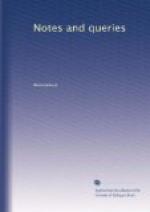I advise the student, as a preliminary step to the inquiry, to attempt a collection of all the accessible evidence, historical and ethnographic, and to place the materials which pertain to each class in the order of time. The historical evidence exists, I believe exclusively, in the works of the chroniclers and bards of Wales; and the ethnographic evidence in the narratives of travellers in America. The opinions of modern writers, the gifted author of Madoc not excepted, he is at liberty to consider as hors-d’oeuere—to be passed on, or tasted, a plaisir. As an exemplification of this plan, I submit some short extracts, with critical remarks:—
“Madoc another of Owen Gwyneth his sonnes left the land [North-Wales] in contention betwixt his brethren, and prepared certaine ships with men and munition, and sought adventures by seas, sailing west, and leaving the coast of Ireland so far north, that he came to a land unknowen, where he saw manie strange things.”—CARADOC OF LLANCARVAN, continued—The historie of Cambria, 1584. 4º. p. 227.
[The history of Caradoc ends
with A.D. 1156. The continuation,
to the year 1270, is ascribed
by Powel, the editor of the
volume, to the monks of Conway
and Stratflur.]
Carmina Meredith filii Rhesi [Meredydd ab Rhys] mentionem facientia de Madoco filio Oweni Gwynedd, et de sua navigatione in terras incognitas. Vixit hic Meredith circiter annum Domini 1477.
Madoc wyf, mwyedic
wedd,
Iawn genau, Owen
Gwynedd;
Ni fynnum dir,
fy enaid oedd,
Na da mawr, ond
y moroedd.
The same in English.
Madoc I am the
sonne of Owen Gwynedd
With stature large,
and comely grace adorned;
No lands at home
nor store of wealth me please,
My minde was whole
to searche the ocean seas.
“These verses I received
of my learned friend M. William
Camden.” Richard
Hakluyt, 1589.
[The eulogy of Meredydd ab
Rhys is very indefinite, but deserves
notice on account of its early
date. He “flourished,” says W.
Owen, “between A.D.
1430 and 1460.”]
“This land must needs be some part of that countrie of which the Spaniardes affirme themselves to be the first finders sith Hannos time; ... Whereupon it is manifest, that that countrie was long before by Brytaines discouered, afore either Columbus or Americus Vespatius lead anie Spaniardes thither. Of the viage and returne of this Madoc there be manie fables fained, as the common people doo use in distance of place {57} and length of time rather to augment than to diminish: but sure it is, that there he was.”—HUMFREY LHOYD, Additions to the Historie of Cambria, p. 228.
[Lhoyd, who translated the
history of Caradoc, and made
considerable additions to
it, died in 1568. He mentions the
second voyage of Madoc, but
cites no authority.]




